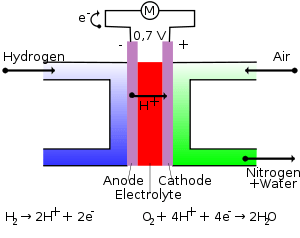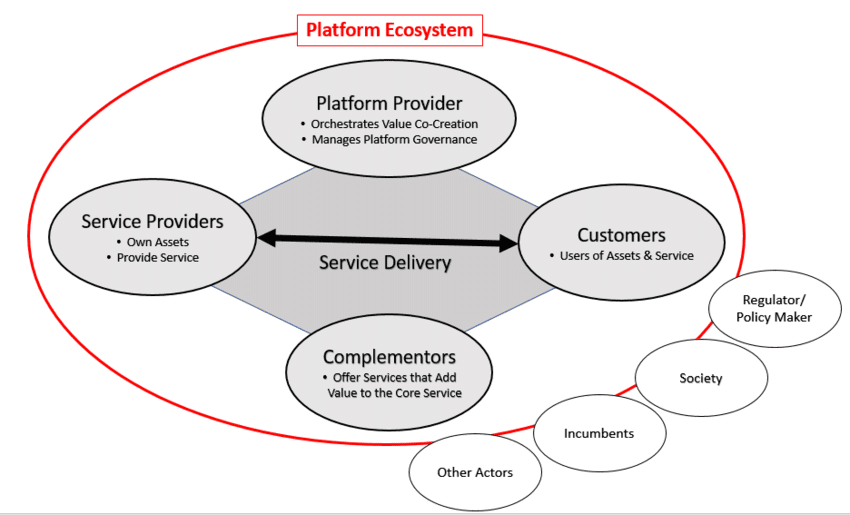
Refrigerated trucks equipped with hydrogen fuel cells to make deliveries in three markets
Grocery merchants in Texas, California and New York will soon have ice cream, frozen foods and fresh produce delivered by tractor trailers whose refrigeration units are powered by fuel cells, a clean technology that makes energy silently and with dramatically reduced emissions.
The fuel cells will do the work normally done by a small diesel engine, which keeps the cargo at the proper temperature while the trucks are making deliveries. Each of the four trucks will still be equipped with a main diesel engine that actually powers the truck.
Researchers at the U.S. Department of Energy’s Pacific Northwest National Laboratory, which is overseeing the project, believe this will be the first time that refrigerated trucks making deliveries have been equipped with a fuel cell — a device that creates electricity by driving chemical reactions using hydrogen and air. The only byproducts are heat and water.
“This is a great application for a fuel cell,” said Kriston Brooks, the PNNL researcher leading the project. “A trailer refrigeration unit traditionally is powered by a small diesel engine or electric motor that drives compressors to provide cooling to the cargo. A fuel cell can potentially provide a clean, quiet and efficient alternative by powering the electric motor.”
Two leading fuel cell manufacturers, Massachusetts-based Nuvera and Albany, N.Y.-based Plug Power Inc., will each receive $650,000 from DOE’s Office of Energy Efficiency and Renewable Energy. The companies will provide matching funds and labor of their own. A PNNL team led by Brooks will oversee and evaluate the two-year program.
Industry officials estimate that approximately 300,000 refrigerated trucks with auxiliary power units are on the road in the United States. By replacing the small diesel engines with the more efficient fuel cell, users will see fuel savings of approximately 10 gallons a day per unit, in addition to reduced emission of pollutants and significantly quieter operation.
“Accelerated fuel cell use in this application is also expected to create jobs in the energy sector, increase fuel cell manufacturing volume, decrease costs, and catalyze a stronger domestic supplier base,” said Jamie Holladay, PNNL’s sector manager for fuel cell technologies.
Fuel cells are becoming more common as energy sources in buildings and in vehicles such as buses. While the devices are generally more expensive than traditional forms of energy generation, many scientists and product developers expect that as they become more widely adopted and production levels increase, their cost will come down, similar to what has happened to products like cell phones.
“One of the goals is to accelerate fuel cell use in industry,” said Brooks. “In spite of their higher costs now, the higher efficiency and zero emissions from fuel cells are enough to convince many companies not to wait to implement this technology. Fuel cell products are already used widely in warehouses, and this project broadens their reach.”
The Latest Bing News on:
Fuel cell use
- Hydrogen Fuel Cells Market Size Is Projected To Reach USD 16.41 Billion By 2031 | SNS Insideron April 27, 2024 at 9:31 pm
Other types include solid oxide, phosphoric acid, and molten carbonate fuel cells, each catering to specific use cases. By application: The transportation sector, particularly electric vehicles (EVs) ...
- What’s that?…A fuel cell that harvests energy from…dirt?on April 26, 2024 at 7:10 am
A soil microbial fuel cell where microbes in dirt could power applications which are literally “in the field”.
- LaFeO3 Perovskite Fuel Cell Technology Boosts SRMAP's Clean Energy Missionon April 26, 2024 at 6:45 am
The significance of this invention cannot be understated in an era where the reliance on clean and efficient energy conversion methods is paramount ...
- RICE develops new underwater robot with a buoyancy control system using fuel cellson April 26, 2024 at 4:31 am
Traditional AUVs rely on thrusters or pumps to adjust depth, which consumes considerable energy and generates noise.
- T.N. is looking at investment partnerships for hydrogen and fuel cell researchon April 26, 2024 at 3:10 am
Investment partnerships for hydrogen and fuel cell research in Tamil Nadu drive growth and sustainability in commercial vehicles.
- Revolutionizing Clean Energy: SRMAP’s Breakthrough in Fuel Cell Technology with LaFeO3 Perovskiteon April 25, 2024 at 11:47 pm
In the quest for sustainable energy solutions to meet the soaring global energy demands, an innovative breakthrough has emerged from the laboratories of SRM University-AP, situated in the picturesque ...
- BAE Systems, Cummins to Collaborate on Hybrid Drivetrain for Transit Buseson April 24, 2024 at 1:04 pm
BAE Systems and Cummins Inc. plan to collaborate on the integration and certification of a B hybrid-compatible diesel engine and hybrid electric ...
- Plasma treatment enhances electrode material for fuel cells in industry, homes and vehicleson April 22, 2024 at 8:52 am
Researchers from Skoltech and their colleagues have improved the properties of a carbon-based electrode material by exposing it to air plasma. Such treatment turned out to enhance electrode ...
- Nikola sees great potential for hydrogen fuel-cell-electric trucks in Canadaon April 21, 2024 at 11:16 am
Canada has emerged as one of the most promising markets for hydrogen-fueled Class 8 trucks, representatives from Nikola said during the VIP breakfast at ...
- Discovery of organic catalyst could lead to cheaper fuel cellson April 15, 2024 at 9:01 am
With atmospheric carbon dioxide at record highs, the search for clean-energy alternatives to the use of fossil fuels is growing increasingly urgent.
The Latest Google Headlines on:
Fuel cell use
[google_news title=”” keyword=”fuel cell use” num_posts=”10″ blurb_length=”0″ show_thumb=”left”]
The Latest Bing News on:
Hydrogen fuel cells
- The 3 Top Hydrogen Stocks to Buy in April 2024on April 28, 2024 at 7:00 am
High interest rates seem to be plaguing many sectors of the economy. The electric vehicle space perhaps received the most coverage, but several renewable energy sectors are reeling from elevated rates ...
- Hydrogen Fuel Cells Market Size Is Projected To Reach USD 16.41 Billion By 2031 | SNS Insideron April 27, 2024 at 9:31 pm
According to SNS Insider, the Hydrogen Fuel Cell M arket valuation to reach USD 16.41 billion by 2031. The estimated CAGR projected for the forecast period of 2024-2031 is 24.87%. The hydrogen fuel ...
- World’s first hydrogen station for commercial trucks opens – is it too late?on April 27, 2024 at 7:58 am
FirstElement Fuels has opened the world's first large-scale hydrogen fueling station for heavy-duty commercial trucks at Port of Oakland.
- Really Cold Hydrogen Could Bring Driving Range Parity with Dieselon April 26, 2024 at 3:33 pm
The time it takes to fuel a hydrogen-powered fuel cell truck is already on par with diesel. But there is still a yawning gap when it comes to comparable driving range.
- Nikola’s Hydrogen-Truck Fueling Strategyon April 26, 2024 at 11:58 am
Nikola’s Hyla Energy division is using modular hydrogen refueling stations to help bridge the chicken-and-egg gap between supply and demand for fuel-cell-electric trucks.
- RICE develops new underwater robot with a buoyancy control system using fuel cellson April 26, 2024 at 4:31 am
Traditional AUVs rely on thrusters or pumps to adjust depth, which consumes considerable energy and generates noise.
- GILLIG to develop hydrogen fuel cell powered buson April 25, 2024 at 9:05 am
GILLIG is collaborating with BAE Systems and Ballard Power Systems on the development of the hydrogen fuel cell bus.
- This legendary brand cracks the code: here’s the most powerful hydrogen fuel cellon April 25, 2024 at 7:29 am
Legendary brand has created the first lightweight hydrogen fuel cell: the most powerful, but the smallest ever seen in history ...
- White Paper: Battery electric vs. hydrogen fuel cell vs. HVO – which is the winning technology?on April 25, 2024 at 7:11 am
In this white paper, Einride compares the three most talked-about alternatives to diesel – battery electric, HVO biofuel, and hydrogen fuel cell – based on four essential factors for long-term ...
- The first big-rig hydrogen fuel station in the U.S. opens in Californiaon April 24, 2024 at 3:00 am
The Port of Oakland is home to the United States' first commercial hydrogen fuel station for big-rig trucks. It's a step on the road to cleaner trucking.
The Latest Google Headlines on:
Hydrogen fuel cells
[google_news title=”” keyword=”hydrogen fuel cells” num_posts=”10″ blurb_length=”0″ show_thumb=”left”]









